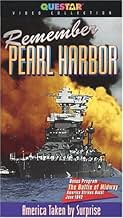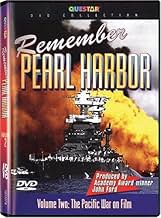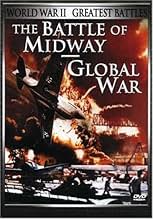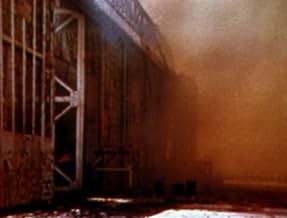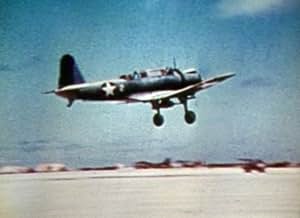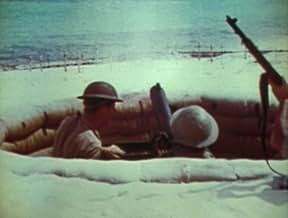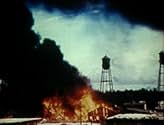IMDb RATING
6.1/10
2.4K
YOUR RATING
The Japanese attack on Midway in June 1942, filmed as it happened.The Japanese attack on Midway in June 1942, filmed as it happened.The Japanese attack on Midway in June 1942, filmed as it happened.
- Director
- Writers
- Stars
- Won 1 Oscar
- 1 win total
Henry Fonda
- Narrator
- (voice)
Jane Darwell
- Narrator
- (voice)
James Roosevelt
- Self - US Army Major
- (as Major Roosevelt)
Donald Crisp
- Main Narrator
- (voice)
- (uncredited)
Irving Pichel
- Narrator
- (voice)
- (uncredited)
Jimmie Thach
- Self - Naval Aviator
- (uncredited)
- Director
- Writers
- All cast & crew
- Production, box office & more at IMDbPro
Featured reviews
This documentary, "The Battle of Midway," is a short film shot during the actual combat on June 4, 1942. The Battle lasted from June 3 to June 7, but the air attack on Midway Island was on June 4. This shows the bombing of the U.S. airfield and positions on Midway. It also shows the defenders in action, and one Japanese plane trailing smoke after it was hit by ground fire.
What is most striking about this film is the concussion of the actual bombs, which have a horizontal spreading impact with huge destruction. What one sees in most movies in which battle scenes are staged, is ground explosions that blow up laterally and dissipate in the air with much less near damage.
Hollywood's John Ford was a Navy officer who directed this and other films for the Navy during WW II. Henry Fonda is the principal narrator. There isn't much by way of aerial combat or Japanese aircraft pictured here. Other Armed Forces photography would capture that. But this documentary earns its stars for the men who shot the film while under heavy enemy fire.
What is most striking about this film is the concussion of the actual bombs, which have a horizontal spreading impact with huge destruction. What one sees in most movies in which battle scenes are staged, is ground explosions that blow up laterally and dissipate in the air with much less near damage.
Hollywood's John Ford was a Navy officer who directed this and other films for the Navy during WW II. Henry Fonda is the principal narrator. There isn't much by way of aerial combat or Japanese aircraft pictured here. Other Armed Forces photography would capture that. But this documentary earns its stars for the men who shot the film while under heavy enemy fire.
Battle of Midway, The (1942)
*** (out of 4)
Henry Fonda and Donald Crisp add narration to the battle scenes shot by John Ford where the director was even wounded by enemy fire. There's really no story being told in this documentary but instead we just see a part of history in beautiful Technicolor. God knows everyone has seen countless war films but there's something unique seeing real ones here. They certainly look a lot different than what we've seen in countless fake movies.
Ford's World War 2 shorts are out there in various forms ranging from public domain companies to the Ford at Fox set. Quality various but the version in the Fox set is the best.
*** (out of 4)
Henry Fonda and Donald Crisp add narration to the battle scenes shot by John Ford where the director was even wounded by enemy fire. There's really no story being told in this documentary but instead we just see a part of history in beautiful Technicolor. God knows everyone has seen countless war films but there's something unique seeing real ones here. They certainly look a lot different than what we've seen in countless fake movies.
Ford's World War 2 shorts are out there in various forms ranging from public domain companies to the Ford at Fox set. Quality various but the version in the Fox set is the best.
"The Battle of Midway" is an important historical film. Imagine...film crews were on the island when it was attacked and soon after rushed this short into theaters to celebrate this HUGE American victory. So, from a historical viewpoint it is an important film. BUT, and there is a but here, seen today the film isn't the wonderful film it was proclaimed to be when it was given an Oscar in 1943. I really think the Oscar purely came because of patriotism--Hollywood's attempt to bolster the war effort by heaping praise and awards on films that drummed up love of country and the war. Seen today, the color print is very faded and scratchy but more importantly the narrative sucks. The film was shot with color but was silent--and all sound effects and narration were added later-- and some of the voiceovers were terrible.
The bottom line is that if you want to see a historical document-- see this. If you want to see a good film that explains the battle well, don't! There are much better documentaries on the battle.
The bottom line is that if you want to see a historical document-- see this. If you want to see a good film that explains the battle well, don't! There are much better documentaries on the battle.
10llltdesq
This incredible compilation of footage won an Academy Award. It was shot by a crew of war cameramen that included John Ford, who I understand actually took some of the footage himself! While watching this, remember that you generally can effectively aim either a camera or a weapon at any one time, but not both and, as a cameraman has his eye to the lense while shooting, that means that he's exposed to all of the nasty stuff flying all around him with little or no cover! That's called "grace under pressure". They got an Oscar and deserved a medal! Highly recommended.
John Ford's celebrated 19-minute documentary about America's first major victory of World War Two earned him a shrapnel wound, a Purple Heart and an Oscar. The first 10 is impressive without being that interesting - hard-won battle footage that largely consists of some stuff setting on fire, the camera shaking, the film cutting, then something else setting on fire - though the raising of the flag is a lovely moment, narrator Irving Pichel intoning: "Yes, this really happened". The second half is more obviously Fordian, the elegiac tone reinforced by hymns, slanting shadows and Jane Darwell's frenzied, corny, but effective narration. Audiences wept and fainted during the passage where she urges ambulance-men to rush injured soldiers to a hospital. Ford would make his definitive statement on the war, and the nature of heroism, with 1945's They Were Expendable, but this short is well worth a look.
Did you know
- TriviaDirector John Ford and cinematographer Joseph H. August were wounded by enemy fire while filming the battle.
- Quotes
Main Narrator: Midway Island. Not much land right enough, but it's our outpost. Your front yard.
- ConnectionsEdited into Ils ont filmé la guerre en couleur (2000)
- SoundtracksAmerica, My Country Tis of Thee
(1832) (uncredited)
Music by Lowell Mason, based on the Music by Henry Carey from "God Save the King" (1744)
Words by Samuel F. Smith
Played in the score and later sung by an offscreen chorus
Details
- Runtime18 minutes
- Sound mix
- Aspect ratio
- 1.37 : 1
Contribute to this page
Suggest an edit or add missing content



